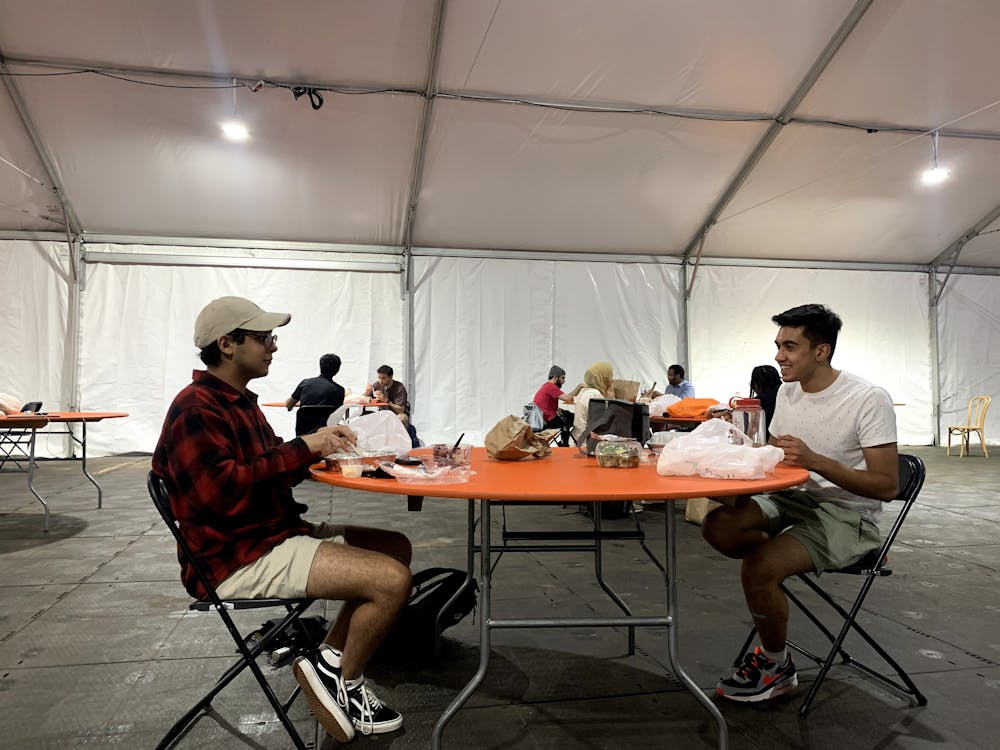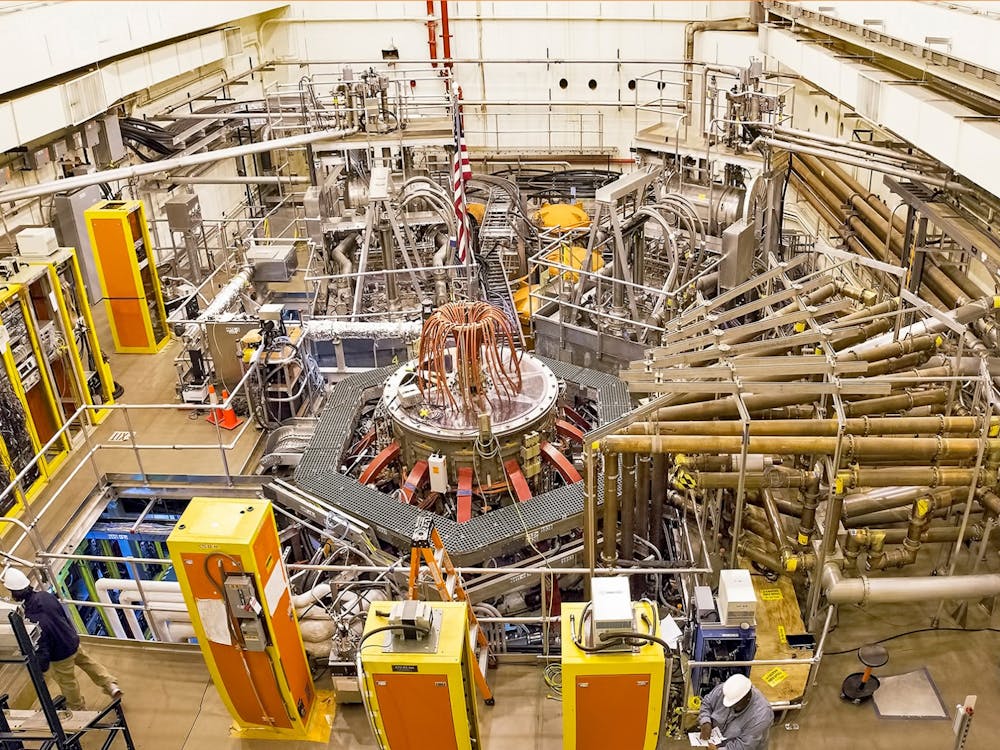The sun has set on Thursday night, and dinner is over in the campus dining halls. In the big white tent on Frist South Lawn, students sit two to a table, shouting over each other, and eating like they haven’t had food since early in the morning. Well, they haven’t.
After a semester of solitary prayers and virtual community, Muslim students on campus are enjoying the opportunity to gather in person for evening meals during the month of Ramadan.
“You can feel that people really care about the community and they really want to make it feel like home,” Saareen Junaid ’23 said.
In order to foster community among students observing Ramadan and help ease their month of fasting, the Muslim Students Association (MSA) has arranged for students to meet on Wednesday nights in the Frist Multipurpose Room and on Thursdays in the tent for Iftar, the meal eaten after sunset. The MSA also sponsors weekly Tigers In Town events so that Muslim students can break their fast together at various restaurants or dessert places around Nassau Street.
“Everyone’s just kind of excited to eat the food and just talk. That’s what I’ve enjoyed the most, being able to go get ice cream with all these people and start meeting frosh,” Emre Cakir ’21 said.
“It’s a very nice community space, and it’s a lot of fun, being able to eat together and break your fast,” Sameer Riaz ’24 added. “And then usually afterward we just end up hanging out. Sometimes until the morning when it’s time to eat again.”
Hifsa Chaudhry ’22, co-president of MSA, explained the importance of providing shared spaces for students.
“Ramadan is notoriously a time when people will become more involved in the Muslim community just because it’s that month where you have this desire to have a communal space,” she said.

“It’s a lot more of a vibrant community than it was before,” she added. She also highlighted the additional community building that has occurred as a result of the widely attended Tigers in Town events — and the free food provided at those events.
Some students who were on campus for Ramadan in 2019 noted that it feels different this year, especially because Murray-Dodge Hall, home of the Office of Religious Life and the Muslim prayer room, is closed.
“There’s really no good way, with the restrictions, to actually be able to pray all together. That was obviously a really big element for us, especially during Ramadan,” Cakir said.
Even though Social Contract restrictions prevent them from gathering for prayers or hosting Iftars for the entire community — as the MSA did in past years in the Carl A. Fields Center — leaders of the association still feel they have successfully engaged members socially and spiritually this month.

“It’s just been amazing how much people are willing to contribute to the month,” Abdelhamid Arbab ’23, who serves as the MSA’s community outreach chair, said. “But also, I think that’s the beauty of the month — everyone is eager, everyone’s excited to get involved, everyone wants to get together, everyone is in this process of building community.”
“I’ve always seen my desire to foster community as an extension of our religiosity … So ever since I’ve come to Princeton, my sort of religious service has been to really establish that community,” noted Shaffin Siddiqui ’22, former MSA president. “I’ve not let [COVID-19] necessarily defeat my ability to reach out to people.”
Siddiqui’s commitment to the community has not gone unnoticed. “He’s the most loving, welcoming … he’s just doing such a great job of making us not feel lonely,” Riaz noted.
Despite the efforts of friendly upperclass students, for many first-years and sophomores, this Ramadan comes with additional challenges, as it is their first time spending it away from their families.
“It definitely tastes different,” Arbab said. “When I’m at home, I’m sort of forced to have community. Here, you have to go out of your way, so that you can choose to have a community.”
“That’s something the month of Ramadan teaches us: don’t take anything for granted, including community,” he added.
While being at home would’ve made it easier to observe Ramadan, Muskan Effendi ’24, who serves as the MSA communications chair, noted that conducting the rituals and prayers for herself for the first time has helped her find more meaning in them.
“I’m finding it nice to be accountable for myself,” she explained. “Sometimes I’ll invite my friends to have “sahur” (the pre-dawn meal) together and pray afterward together outside.”
Balancing the demands of Princeton life with the rituals of Ramadan has presented an additional challenge to students. However, as Muslim Life Program (MLP) Coordinator Sabrina Mirza explained, they are still able to find meaning in the small moments.
“It’s a month that we consider to be so blessed and anything you do, any charity you give is multiplied. So, I think the students are really trying to balance their schoolwork with finding those moments,” she said.
More than Social Contract restrictions or academic challenges, what has made this Ramadan truly different from past years, for many students, is the loss of Muslim Chaplain Sohaib Sultan. Sultan died of cancer during the first week of the fast.
Grappling with this shared loss while observing Ramadan has heightened the importance of community.
“Imam Sohaib not being here is definitely really weird. During Ramadan, especially, he and [his wife] Arshe and [daughter] Radiyya were just such a big presence. And he’d always be the one leading us in prayer and always welcoming us,” Cakir explained.
“The community is really hurting right now, especially during Ramadan, because it’s a time where you intensely reflect back into your spirituality,” Junaid added. “We’re really missing that spiritual leader. It just feels like a void.”
Many students attended Sultan’s burial in Hamilton Township on Saturday, April 17, which provided a much-needed outlet for support in a time of mourning.
“Imam Sohaib was a really respected figure and his passing has been difficult, to say the least. But I think just in terms of community gatherings and spaces, Ramadan is one of the best times for the community to come together, even if they are grieving,” Chaudhry said.
“It just feels different this year,” Junaid noted. “The loss makes every day feel so slow.”
She also expressed her fear for the future of the Muslim student community. “That’s one thing that I'm really nervous about this Ramadan, and also just for the future, because that leader who cared so much about making so many people feel heard, he's gone now. So it's scary,” she explained.
However, even as they grieve, the organized events of this month demonstrate how Muslim student leaders have taken on the responsibility of continuing Sultan’s legacy of warmth and inclusivity. For some, the student leaders’ efforts give them hope for the future of the community.
“The fact that these students are like ‘let’s arrange for these things on our own,’ that takes a lot of initiative and motivation on their end,” Mirza said. “And so, I’m just super proud of everything that they’re doing.”








